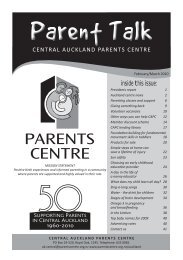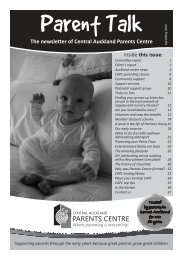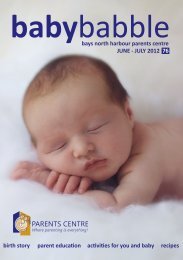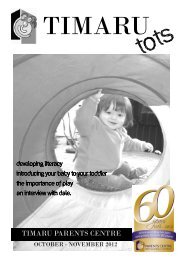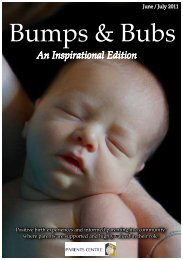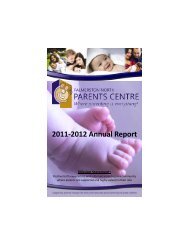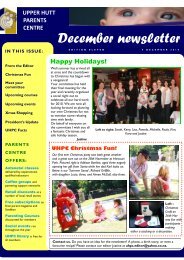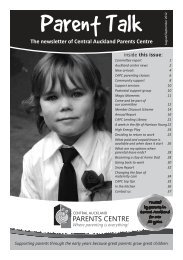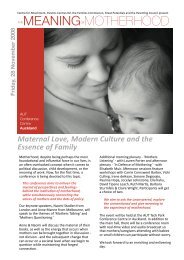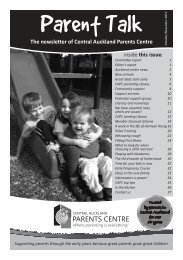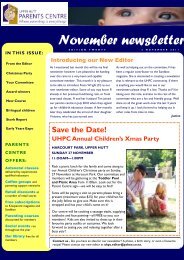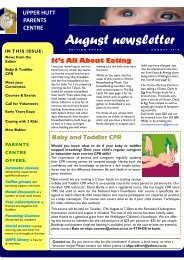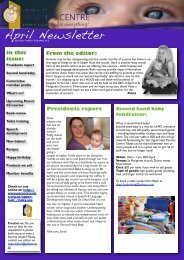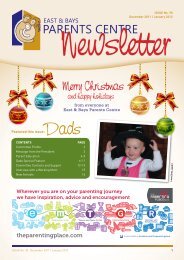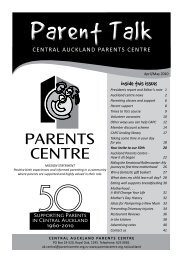The Dirty Diaper - Parents Centres New Zealand Inc
The Dirty Diaper - Parents Centres New Zealand Inc
The Dirty Diaper - Parents Centres New Zealand Inc
You also want an ePaper? Increase the reach of your titles
YUMPU automatically turns print PDFs into web optimized ePapers that Google loves.
From the Editor<br />
<strong>The</strong> <strong>Dirty</strong> <strong>Diaper</strong><br />
Issue 69<br />
BAYS NORTH HARBOUR PARENTS CENTRE<br />
Well ladies and gents, this is my last newsletter as editor!<br />
It’s been an absolute pleasure putting this newsletter together for you for the last 3<br />
years. During that time I’ve gone from a new Mum with a 6 month old to an old<br />
Mum (some days anyway!) with a 4 year old and 18 month old. So much change in<br />
such a short time. And it’s time for change again...Kindy is now looking for volun‐<br />
teers!<br />
Jo Hayes has volunteered for the role and is very excited and looking forward to<br />
putting together her first issue for June/July<br />
As my last “From the Editor” I’d like to emphasis my messages over the last year or<br />
so. Enjoy this journey of parenthood as much as you can, some days are tough but<br />
tomorrow is always fresh start! Relax and soak up this special time with your little<br />
ones. I’ve been watching Nigel Latta’s “Guide to Parenting Teens” on TV1 and not<br />
only is he hilarious, but man, do we have a job ahead of us! Gross nappies and pu‐<br />
reed food on the floor sounds quite easy to deal with suddenly. Have a great ride!<br />
Karen Whackett ‐ Outgoing Editor<br />
April/May 2011<br />
North Shore Parent Centre’s<br />
Course Spotlight<br />
Dad’s Only (O)<br />
Chris Morris from Jumping Beans has<br />
kindly offered us his time, expertise and<br />
equipment to have a Saturday morning<br />
class just for Dads and their crawlers/<br />
toddlers. Chris is going to teach Dad’s<br />
some excellent tips for playing with their<br />
little people using the specialist<br />
equipment he uses for his own business.<br />
Toddlers, Tantrums and Timeouts (B)<br />
Laura Morley teacher and mother of 3<br />
will share strategies and tips for how to<br />
reduce and deal with toddler tantrums.<br />
Focusing on how to effectively use<br />
timeout to teach toddlers boundaries.<br />
See page 4 for details
Welcome<br />
to the<br />
world<br />
Baby!<br />
COMMUNITY NEWS AND EVENTS<br />
What’s On In April<br />
Every Tuesday and Friday at the Bruce Mason Centre is<br />
Mums n Kids Magical Story Time from 10am. $5<br />
2nd: Beach Day Out at Cheltenham Beach & Balmain Reserve<br />
Beach games ‐ Sandcastle and mudcastle contests, gumboot<br />
toss, bury your friend, facepainting and preschool play area.<br />
From 11am ‐ 2pm<br />
3rd: APO 4 Kids at the Bruce Mason Centre. <strong>The</strong> orchestra's<br />
fun packed pre‐schoolers' concert is from 10.30am ‐ 12noon<br />
6th: Mummy Morning at Westfield Glenfield from 10.30am.<br />
Goodie bags for 40 random attendees (register on the day).<br />
<strong>The</strong>re are nannies on hand to help keep your under 5<br />
occupied while you enjoy a free coffee!<br />
26th‐29th: Monty's Birthday Carnival ‐ Monty at the Zoo at<br />
Westfield Shore City at 1.30pm. Bring your children to meet<br />
Monty and his mates.<br />
What’s On In May<br />
4th: Mummy Morning at Westfield Glenfield from 10.30am.<br />
Goodie bags for 40 random attendees (register on the day).<br />
<strong>The</strong>re are nannies on hand to help keep your under 5<br />
occupied while you enjoy a free coffee!<br />
7th: Stanley Bay School Gigantic Garage Sale and Family Fun<br />
Day from 8am to 2pm. Don't miss the North Shore's biggest<br />
ever garage sale combined with a not‐to‐miss Family Fun<br />
Day.<br />
8th: Mother’s Day High Tea at Stafford Villa from 2.30pm.<br />
Spoil Mum this Mother's Day, step back in time, indulge your<br />
taste buds and experience a time gone by with a glass of<br />
French bubbles on arrival, dainty sandwiches, sweet treats,<br />
gourmet savouries, buttermilk scones with berry jams and<br />
crème all served on traditional tiered plates.<br />
To book call 418 3022 or email rest@staffordvilla.co.nz<br />
Debbie & Trevor Glass Abby Jana Lee‐Gibbs & Richard Gibbs Heidi<br />
Lisa Gaines & Matthew Wall Ava Katrina & Brendon Hosken Hunter<br />
Philippa Hayward & Bevan Crothers Benjamin Nicole & Alan MacKinven Isla<br />
Kirsty McAlpine & Mark Wilson Cade Carole & Scott Oliver Jack<br />
Simone O'Meara & Aaron Warner Caitlin Samantha & Philip Yearbury Jasmine<br />
Lisa & Greg Hope Callum Melanie & Brad Norman Jesse<br />
Rebecca Grieve & Ricky Smith Casey Sandra & Dave Fowler Jonathan<br />
Kristin & Peter Hadley‐Helleur Charlotte Kim Martin & Antoine Fowler Liam<br />
Rachelle Luxford & Daniel Barrett Chloe Rachel & Kevin Enderby Max<br />
Helen Robertson & Andrew Ross Eli Natalia Kulikova & Jeff Pringle Max<br />
Keryn Dale Elyse Karena & Todd Brannigan Molly<br />
Sarah & John Greenwood Emily Susan & Adrian Price Oscar<br />
Philippa & Evan Bateup Emma Stephanie & Carl Larcombe Paige<br />
Amanda & Matt Green Ethan Nicola & Jason Kendrick Reilly<br />
Helen Linane Felix Andrea & Duane Read Riley<br />
Emma & Justin Guy George Jennifer & Brent Bowden Samuel<br />
Bronwyn & Karl O'Connell<br />
Page 2<br />
Georgina Aileen & Richard Collins Sean
VOLUNTEERING<br />
If you would like to help out our Centre in any way please get<br />
in contact, we’re a volunteer organisation and we’re all<br />
Mums and Dads just like you! We’re a friendly bunch and by<br />
helping out you’ll meet new people who are also on this<br />
parenting journey and maybe keep your skills up while you’re<br />
off work or learn new skills. And we have tea, coffee and<br />
cookies at our meetings! .<br />
We are currently in need of volunteers to help with the<br />
following roles:<br />
• Website Administrator<br />
• Antenatal Support<br />
Email bays.nth.harbour@ parentscentre.org.nz for more<br />
BAYS NORTH HARBOUR PARENTS CENTRE NEWS<br />
Committee <strong>New</strong>s<br />
We would like to welcome three new volunteers to our<br />
committee. A big hello to Jo Hayes (<strong>New</strong>sletter Editor), Taina<br />
Smith (CBE Coordinator Support) and Rachelle Barrette (Tiny<br />
Tums Convenor) . Thanks for volunteering your time.<br />
Sarah Marsh is now focusing on our other Parent Education<br />
courses and seminars, you can now contact her at<br />
bnhpcparented@gmail.com.<br />
Thank you to Jolene Stewart who has stepped down from<br />
her role as CBE Support, we wish you all the best and thanks<br />
for your time.<br />
Our committee meetings are held on the second Tuesday of<br />
each month and if you’re keen to come along and find out<br />
some of the inner workings of our Centre you are more than<br />
welcome. Email Caroline at bnhpcsecretary@gmail.com.<br />
Premmie Kit<br />
Bays North Harbour <strong>Parents</strong><br />
Centre has a set of premature<br />
baby clothing to lend to families<br />
for those unexpected early<br />
arrivals. If you find yourself in<br />
this situation, please contact<br />
Kay, our CBE Coordinator, who<br />
will send some clothing your way to tide you over.<br />
Contact Kay to borrow: baysnorthcbe@gmail.com<br />
Work and family: in a nutshell<br />
Returning to work after the birth of your child can be<br />
challenging. You might feel excited or nervous about<br />
rejoining the work force, guilty at leaving your child, or<br />
stressed about managing the extra workload.<br />
Tips for returning to work<br />
•Think about what your new routine will be like and<br />
introduce changes before you go back to work.<br />
•Have some ‘practice separations’ from your child before<br />
you return to work, perhaps leaving her with her new carer<br />
for short periods.<br />
•Plan catch‐up times with your partner.<br />
•Check what family‐friendly policies and provisions are<br />
available in your workplace.<br />
•Try not to take your work home with you at night.<br />
•Ease the morning rush by preparing as much as possible the<br />
night before.<br />
•Make cooking easier by freezing extra portions or trying<br />
quick and easy family recipes.<br />
•Keep an eye on your stress levels.<br />
This article is an extract only. For more information visit<br />
raisingchildren.net.au/work__family/work_and_family.html<br />
Sourced from the Raising Children Network's comprehensive<br />
and quality‐assured Australian parenting website.<br />
Page 3
Page 4<br />
PARENT EDUCATION<br />
Bays North Harbour <strong>Parents</strong> Centre<br />
Toddlers, Tantrums and Timeouts<br />
This seminar is designed for parents wanting ideas to deal<br />
with 1‐3 year old behaviour. Laura Morley teacher and<br />
mother of 3 will share strategies and tips for how to reduce<br />
and deal with toddler tantrums. Focusing on how to<br />
effectively use timeout to teach toddlers boundaries.<br />
Next course: Wednesday 6th April 7.30pm ‐ 9.30pm<br />
Cost: $20 for members ($25 non‐members)<br />
To enrol email bnhpcparented@gmail.com<br />
Baby Sign<br />
This 2 hour workshop will introduce you to the basics of<br />
teaching baby sign language to your hearing child.<br />
You will be shown how gestures and signs are a natural part<br />
of the way we communicate and that using this tool can help<br />
reduce frustration and tantrums.<br />
Next course: May 2011 TBC<br />
Cost: $30 for members ($40 non‐members)<br />
For more information email bnhpcparented@gmail.com<br />
Tiny Tums<br />
Formerly the Munching session of “Moving & Munching”<br />
Dr Cathy Conlon is a Mum and lecturer in Nutrition at Massey<br />
University. Her area of expertise is in Infant Nutrition<br />
including Paediatric Nutrition and Nutrition of Premature<br />
babies.<br />
Cathy will cover introducing solids and appropriate nutrition<br />
for your infant until they reach the toddler stage. She will also<br />
answer any questions you may have in an open discussion<br />
format.<br />
For parents of babies 4 months+<br />
Next course: Wednesday 6th April 1pm ‐ 2.30pm<br />
Wednesday 15th June 1pm ‐ 2.30pm<br />
Cost: $15 for members ($20 non‐members)<br />
To enrol email bnhpcmoveandmunch@gmail.com<br />
Tinies to Tots<br />
Wendy Perera is a mum and trained early childhood teacher.<br />
Her comprehensive one hour seminar will cover fine and<br />
gross motor skills, language and literacy, and social and<br />
emotional development. It promises to be full of practical<br />
tips and fun ideas.<br />
If you would like to know more about ‐ Walking, Ball Skills,<br />
Reading, Language acquisition, Meal Times, Bath Time,<br />
Temper Tantrums, Attachment <strong>The</strong>ory, and Age appropriate<br />
toys then you won't want to miss this course.<br />
Next course: Thursday 7th July 7.30pm ‐ 8.30pm<br />
Cost: $15 for members ($20 non‐members)<br />
To enrol email bnhpcparented@gmail.com<br />
North Shore <strong>Parents</strong> Centre Classes<br />
Onewa & Waitemata <strong>Parents</strong> <strong>Centres</strong><br />
Dad’s Only (O)<br />
Lots of Mum’s get to take their little ones to gym or Jumping<br />
Beans but very few Dads get that opportunity as lots of them<br />
are working.<br />
Chris Morris from Jumping Beans has kindly offered us his<br />
time, expertise and equipment to have a Saturday morning<br />
class just for Dads and their crawlers/toddlers. Chris is going<br />
to teach Dad’s some excellent tips for playing with their little<br />
people using the specialist equipment he uses for his own<br />
business.<br />
Due to the practical nature of the course, spaces are limited.<br />
Next course: Saturday 21st May 10.30am ‐ 12.30pm<br />
Cost: $20 for members ($30 non‐members)<br />
To enrol email opcparented@gmail.com<br />
First Aid and CPR (O)<br />
For all parents and other care givers, this course covers CPR<br />
on both toddler and adult dummies, and other basic first aid<br />
likely to be required in families with Toddlers.<br />
Next course: Tuesday 12th April 7pm ‐ 9pm<br />
Cost: $15 for members ($30 for non‐members)<br />
To enrol email opcparented@gmail.com<br />
Sleep and Toilet Training (O)<br />
Discussions and advice on sleep problems such as changing<br />
from a cot to a bed, waking at night, coming out of the<br />
bedroom.<br />
Also when and how to toilet train your child, including signs of<br />
readiness.<br />
Bring your questions and issues for open discussion and<br />
receive tips from our speaker, Marie‐Louise, and other<br />
parents<br />
Next course: Tuesdays 26th April 7pm ‐ 9pm<br />
Cost: $15 for members ($30 non‐members)<br />
To enrol email opcparented@gmail.com<br />
Speech and Language Development (O)<br />
For parents of 6‐18 month olds, this course covers the<br />
development of language skills, strategies to facilitate<br />
language acquisition and how feeding fits in with speaking.<br />
Next course: Tuesday 24th May 7pm ‐ 9pm<br />
Cost: $15 for members ($30 non‐members)<br />
To enrol email opcparented@gmail.com
Barnados Parent Helpline (9-5 Mon-<br />
Fri)<br />
Bottle Feeding Support ($1.99/min<br />
0800 472 7368<br />
Mon-Thurs 12-3pm) 0900 59955<br />
Healthline 0800 611 116<br />
Immunisation Advisory<br />
La Leche League (Breastfeeding<br />
0800 IMMUNE<br />
Support) 846 0752<br />
Man Alive (Support for Dads) 835 0509<br />
Plunket Car Seat Hire 486 3614<br />
Plunket Family Centre 489 9778<br />
PlunketLine (24hrs) 0800 933 922<br />
Womens & Childrens Refuge (24hrs) 410 6736<br />
PARENT SUPPORT<br />
Hi Mums and Dads,<br />
My name is Sarah and I am<br />
currently studying to become<br />
a Childbirth Educator. I am<br />
also a mum to Isabelle 2 ½<br />
and expecting a little boy in<br />
April 2011. I have been a<br />
volunteer with the Bays<br />
North Harbour Parent centre<br />
for the past 2 years and it has<br />
been through the people I<br />
have met and things I have<br />
learnt about pregnancy and<br />
birth during this time that I<br />
have been encouraged to pursue this study.<br />
An important part of our course is to support 2 women<br />
through the last weeks of their pregnancy, the birth of<br />
their baby, and for 6 weeks post‐birth. My participation<br />
in the birth could be purely observational, or I could<br />
offer myself as additional support to yourself or your<br />
partner in whatever capacity you feel comfortable.<br />
Post‐birth support is a particular passion of mine and<br />
given that I am expecting a baby myself shortly I think it<br />
would be a wonderful opportunity to form a friendship<br />
with another new mum.<br />
If you would be open to having a student observe your<br />
birth or would like extra support and friendship during<br />
this time I would love to hear from you. Please feel free<br />
to contact me on 475 9572 to discuss it further.<br />
<strong>The</strong> Post Natal Distress Support Network Trust has now<br />
made their Post Natal Support Group available<br />
on the North Shore, Glenfield.<br />
Post Natal Distress Support Network Trust<br />
offers free support services for<br />
postnatal depression. <strong>The</strong>y offer a<br />
support group, telephone support, and<br />
drop–in support.<br />
<strong>The</strong> Post Natal Support Group is a gentle, safe<br />
environment for you to be with other women who have<br />
similar experiences and feelings. It is a time for you to<br />
share what’s going on for you, if you wish. <strong>The</strong>re is no<br />
expectation that you have to share, you can just come<br />
and listen if that feels right. You can attend as often as<br />
you feel you need to and you can be from anywhere in<br />
Auckland.<br />
You do not need a referral from your doctor or any<br />
other practitioner or specialist. All of our services are<br />
free.<br />
For information about the time and day of the North<br />
Shore Support Group please contact their offices on 836<br />
6967. <strong>The</strong> Post Natal Distress Support Network Trust<br />
offices are at 2 Claude Brooks Dve, Henderson. <strong>The</strong>ir<br />
website is www.postnataldistress.org.nz<br />
Page 5
Breastfeeding Tips from Huggies.co.nz<br />
◊ Try to offer your baby your breast as soon<br />
as you can after giving birth, even in the<br />
delivery room if this is possible<br />
◊ Limit the amount of visitors you have right<br />
after you give birth so there are ample<br />
opportunities for you to bond with and<br />
nurse your baby<br />
◊ Breastfeed for as long as necessary. Some<br />
newborns may need up to 45 minutes to<br />
complete a feed<br />
◊ Try not to restrict the amount of time or<br />
frequency of breastfeeding<br />
◊ Don’t try to breastfeed a crying baby. Calm<br />
your baby down first and then start to<br />
breastfeed<br />
◊ If your nipples are sore or cracked try a<br />
soothing ointment or balm. Make sure it’s<br />
non‐toxic and specifically for breastfeeding<br />
mums. Some mums find their own breast<br />
milk soothes sore nipples<br />
◊ When your baby is finished nursing or you<br />
need to reposition, put your little finger<br />
into the corner of your baby’s mouth to<br />
release the sucking, this will save your<br />
nipples!<br />
Page 6<br />
◊ Long before you start breastfeeding you<br />
should quit smoking as it can make the<br />
milk taste bad for your baby<br />
◊ Try to avoid underwire bra’s whilst<br />
breastfeeding as these can cause infection<br />
◊ Breastfeeding is important to your baby’s<br />
health. If you are having difficulties with<br />
breastfeeding, there are many<br />
breastfeeding support groups and nurses<br />
out there who can work with you to solve<br />
your breastfeeding problems so you can<br />
enjoy this wonderful part of being a<br />
mother.<br />
◊ If your baby turns his head away from your<br />
nipple, gently stroke his face (on the side<br />
closest to you). This will cause your baby to<br />
face towards your nipple. To get your baby<br />
to open his mouth, gently rock him<br />
towards and then away from your nipple.<br />
When your baby’s mouth is open wide,<br />
gently move him towards your breast (chin<br />
first). You need to make sure that your<br />
baby’s bottom lip and tongue make<br />
contact with your breast first. Once he<br />
latches on, hold him firmly against your<br />
breast.<br />
DON’T TRY TO<br />
BREASTFEED A<br />
CRYING BABY.<br />
CALM YOUR<br />
BABY DOWN<br />
FIRST
Funky stuff for cool kids<br />
10% off purchases from<br />
3wisemonkeys.co.nz<br />
Quote the code when ordering<br />
Home help for new parents &<br />
newborn nappy hire kits. Free<br />
postage on nappy hire kits. For<br />
more details see pepsicles.co.nz.<br />
Please quote “in the subject when emailing them<br />
10% off Naturopharm homeopathic products at<br />
Pharmacy @ Apollo (Apollo Health Centre) with<br />
membership card.<br />
MEMBER DISCOUNT SCHEME<br />
NEW! <strong>The</strong> YMCA North Shore is offering North Shore <strong>Parents</strong> Centre members a 10%<br />
discount on their y‐kids term programmes: Preschool (2‐5 year olds) & Afterschool (5‐12<br />
year olds) Gymnastics, and Dance classes.<br />
For more information call YMCA North Shore on 480 7099 or visit their website<br />
www.ymcaauckland.org.nz/find‐your‐ymca/ymca‐northshore and click on their “Term<br />
Programmes” link.<br />
YMCA North Shore can be found on Akorange Dve, Northcote and recently reopened<br />
after extensive renovations.<br />
Present your <strong>Parents</strong> Centre membership card at<br />
Devonport Lingerie and receive 10% discount on<br />
Maternity Products. Shop 3 <strong>The</strong> Arcade, 13<br />
Victoria Road, Devonport<br />
Solids Starter Kit' 15% off<br />
purchases at<br />
www.mumiandbubi.co.nz.<br />
Please enter the following voucher code in the<br />
shopping cart:<br />
Your first choice in baby gear.<br />
20% discount with coupon on special<br />
member shopping days<br />
Would you like to add your business to our scheme? Please email us at baysnorthharbour@gmail.com<br />
Baby play and learning: in a nutshell<br />
Playing with babies helps them develop a<br />
sense of themselves and their place in the<br />
world. Playtime starts from birth, when<br />
everything is new.<br />
•Babies learn by cause and effect – they<br />
learn that when they shakes a rattle it<br />
makes a noise.<br />
•Introduce new toys one at a time, to help<br />
your baby develop learning and attention<br />
skills.<br />
•Your job is to create a safe and stimulating<br />
environment where baby can explore and<br />
learn.<br />
Baby games<br />
•Make lots of noise together.<br />
•Make reading together a special time.<br />
•Try simple games such as pat‐a‐cake,<br />
peekaboo and ‘This little piggy’. Tickle your<br />
baby’s tummy or blow raspberries.<br />
•Build up a collection of simple but safe<br />
odds and ends for your baby to play with.<br />
This article is an extract only. For more<br />
information visit raisingchildren.net.au/<br />
play__learning/babies_play_learning.html<br />
Page 7
don't be fooled by<br />
labels with 'light' or<br />
'lite' ‐ it doesn't<br />
mean that they are<br />
lower in fat<br />
Page 8<br />
Food Labels ‐ What Do <strong>The</strong>y Mean?<br />
<strong>The</strong>re are no simple things to look for when<br />
you're choosing snacks for the lunch box.<br />
But, by understanding these rules food<br />
labels can actually become a source of<br />
useful information.<br />
By law all food manufactures have to<br />
include a food information table on the<br />
product. This provides the full nutritional<br />
breakdown ‐ for example the amount of<br />
kilojoules/calories, fat, sugar and protein<br />
etc and it also provides a full ingredient list<br />
(i.e. what actually goes into the product<br />
during manufacturing). This information,<br />
although a tad overwhelming when you<br />
don't know what you are looking at, can<br />
actually help you find out if a food is<br />
healthy or not.<br />
Here are some simple rules for reading<br />
food labels:<br />
• Calories and Kilojoules are both measures<br />
of the amount of energy in a product.<br />
<strong>The</strong>y basically mean the same thing but<br />
are just different units of measure just like<br />
grams or milligrams. <strong>The</strong>re are 4.2 kJ to 1<br />
calorie (so if you are looking at the calorie<br />
amount times it by 4.2 to get it into<br />
kilojoules).<br />
• Always look at the 100g or the 100ml<br />
column on the back of the product. All<br />
food items must have this column<br />
somewhere on the label and it makes it<br />
much easier to compare the nutritional<br />
values between two products. This is<br />
probably the most important of all tips!<br />
• Choose the product with the least amount<br />
of saturated fat, sodium and sugar per<br />
100g or 100ml, it helps to look at all three.<br />
• Sodium and salt are the same thing!<br />
Sodium is just the technical word for<br />
salt...so don't let it confuse you.<br />
• Ideally, look for foods that have 120mg<br />
per 100g or less of salt (sodium). Choose<br />
foods and drinks with less than 15g per<br />
100g or less of sugar. <strong>The</strong> reality is that in<br />
our society today kids get much more<br />
than the ideal intake of both sugar and<br />
salt.<br />
• Some food labels don't split out sugars so<br />
don't be fooled...just because it doesn't<br />
give a sugar amount doesn't meant that it<br />
doesn't contain sugar. <strong>The</strong> sugar content<br />
is sometimes expressed as part of the<br />
total carbohydrate level. A simple rule to<br />
work out the amount of sugar is to look at<br />
the carbohydrate total and subtract any<br />
fibre or probiotic values. <strong>The</strong> rest is<br />
sugar!<br />
• 1 teaspoon of sugar = 4g. This is a nice<br />
way to visual the amount of sugar in a<br />
product.<br />
• To be called low fat a food must contain<br />
3g or less of fat per 100g or less than 1.5g<br />
per 100ml for a liquid.<br />
• A warning...don't just focus on fat ‐ pay<br />
close attention to the sugar content too<br />
as some low fat/lite foods are very high in<br />
sugar to achieve a good taste.<br />
• To be considered fat‐free, food must have<br />
0.15g of fat or less per 100g or 100ml.<br />
Remember fat is not ALL bad, kids need a<br />
certain amount of fat in their diet for<br />
normal growth and development. <strong>The</strong><br />
key like everything else is moderation!<br />
Try to opt for the healthy fats where you<br />
can, this will help to reduce the amount<br />
of saturated fat in their diet.<br />
• Remember to look on the label for<br />
important nutrients like fibre, calcium,<br />
protein, iron and vitamins. Sometimes it<br />
is worth having a slightly higher fat or<br />
kilojoule snack if it means it is providing<br />
your child with these other important<br />
things. A good example here is yoghurt<br />
which is packed with calcium, protein and<br />
other bone building nutrients.<br />
• When you look at a food label look at the<br />
recommended serving size. Some<br />
products give information for a single<br />
serve but the full bottle actually equates<br />
to 2 serves. This can be misleading as you<br />
end up getting double the amount of fat,<br />
salt, sugar and kilojoules. Energy or<br />
cordial prepackaged drinks are a common<br />
culprit.<br />
• Don't be fooled by labels with 'light' or<br />
'lite' ‐ it doesn't mean that they are lower<br />
in fat or kilojoules. Sometimes this can<br />
just be referring to the flavour ‐ i.e. Olive<br />
oil.<br />
• 'No added sugar' does not mean that a<br />
food or drink is sugar free. In <strong>New</strong><br />
<strong>Zealand</strong> this means that there is no added<br />
sucrose (a particular type of sugar), but it<br />
may still contain other types of sugar.<br />
Sugar is sugar...our bodies can't<br />
differentiate between the different types<br />
of sugar so it is best to focus on the total<br />
amount of sugar consumed where<br />
possible.<br />
Article Source: www.yumyumkids.co.nz
Silent Night? Sample from the book Call Me Dad<br />
Now that you are two plus baby, you’ll<br />
develop a different understanding and<br />
appreciation of the meaning of sleep which<br />
will continue over the next few years. We<br />
recommend wearing your ‘sleep is for the<br />
weak’ T‐shirt and smiling when you’re tired.<br />
By the way, sleep issues tend to come back<br />
several times when your baby hits certain<br />
developmental milestones. For most<br />
babies, most problems are reasonably<br />
short‐lived, and there will come a time<br />
(even though you won’t believe it when<br />
you’re pacing up and down at three in the<br />
morning) that your child will sleep<br />
peacefully all night long.<br />
But, to begin with . . .<br />
THE FIRST NIGHT<br />
Amazingly, there is a good chance that your<br />
first night with the baby will be great,<br />
mainly because the baby will be so<br />
knackered from the birth that she sleeps for<br />
many hours on end, allowing everyone else<br />
to get some much needed rest. If this is not<br />
the case for you, don’t worry about it: you<br />
might as well get used to restless nights.<br />
. . . AND BEYOND<br />
Typically the second or third nights after<br />
the birth can be very challenging as the<br />
baby now demands full attention and will<br />
definitely let you know when he’s hungry<br />
or unhappy about something. As you’ll<br />
discover, babies are equipped with a<br />
perfect mechanism for letting you know<br />
exactly what they need:<br />
What the baby wants to tell you:<br />
I’m still dealing with the after‐effects<br />
of birth – my head hurts.<br />
I’m hungry.<br />
I’m tired but can’t settle.<br />
I’ve got colic.<br />
My nappy is full.<br />
I don’t like all these people and<br />
noises.<br />
I’m not comfortable in my current<br />
position.<br />
I’m too hot/too cold.<br />
Nothing is wrong.<br />
How the baby tells you:<br />
Cries a lot.<br />
Cries a lot.<br />
Cries.<br />
Cries a lot.<br />
Cries.<br />
Cries a lot.<br />
Cries.<br />
Cries.<br />
Cries anyway.<br />
Call Me Dad! provides helpful advice about all aspects of being a dad, such as:<br />
What to expect during pregnancy, Working out the logistics, Surviving the birth, Life<br />
after birth, Establishing routines, Different exercises you can try with your baby.<br />
Go to www.diyfather.com for more information<br />
Page 9
Benefits of Family Meals<br />
<strong>New</strong> <strong>Zealand</strong> research undertaken on over 3000 ethnically diverse teenagers attending<br />
school indicates that families who eat meals together have more nutritious foods available<br />
at home and are more likely to support their children eating well. Frequency of family meals<br />
was associated with other positive health behaviours such as limitations on television use,<br />
having fruit available in the home, consuming five fruits and vegetables a day, eating<br />
breakfast and bringing lunch from home.<br />
Less than half of the teenagers surveyed had eaten a family meal on the previous five school<br />
nights, indicating most families do not eat together every night of the school week.<br />
Body mass index (BMI) did not differ significantly by family meal frequency, possibly<br />
because the research also showed that households where meals are frequently eaten as a<br />
family were just as likely to contain less healthy snack foods (which teenagers ate regularly),<br />
compared with those households where family meals are infrequent.<br />
<strong>The</strong>re are clearly a number of positive nutritional aspects associated with frequently eaten<br />
meals together as a family, but there are issues that make this difficult for many families.<br />
When food preparation and consumption as a family is not possible it is even more<br />
important that parents provide healthy foods/ingredients in the home environment, so that<br />
meals and snacks with a reasonable nutritional value can be prepared as required.<br />
Article Source: Watties Nutrition news<br />
Note from the editor: Family meals aren’t all about teenagers. Both my kids started eating<br />
better when we started sitting down as often as possible and having dinner together, and<br />
they’re just 18 months and 4 years old! Sure, they usually have dinner about 4.30 ‐ 5.00,<br />
before Dad gets home from work, but I’ll often have dinner with them. <strong>The</strong>n they’ll have<br />
fruit or yoghurt as dessert, which they eat while Dad has dinner. Once or twice a week I’ll<br />
give them an extra large afternoon tea and we all sit down to dinner together when Dad<br />
gets home. <strong>The</strong> kids love it and I love the reduction in dinner time arguments!<br />
Finger food dinners have been wonderful with my toddler, Sam and I will sit down to our<br />
“proper” dinner while Tom feeds himself from a variety of finger foods. A lot less mess than<br />
giving him a spoon I can tell you!<br />
Page 10
BABIES AND<br />
TODDLERS NEED<br />
STRONG<br />
RELATIONSHIPS<br />
WITH THEIR<br />
PRIMARY CARERS,<br />
TO BE HELD AND<br />
CUDDLED AND<br />
SPEND RELAXED,<br />
QUALITY TIME.<br />
According to Kathy Walker, Australian<br />
research has identified a decline in verbal<br />
skills amongst pre‐schoolers. We know<br />
babies require constant interaction with<br />
adults to foster thinking and language<br />
development. <strong>The</strong> pace of modern life<br />
means parents are spending less time with<br />
their young families.<br />
<strong>The</strong>re’s an urgent need for parents to<br />
spend time and talk with their babies.<br />
Low oral language skills make it challenging<br />
for children to read and write in primary<br />
school. It can cause frustration if they’re<br />
not able to communicate their needs.<br />
Frustration can lead to low self‐esteem and<br />
also misbehaviour.<br />
How can you encourage thinking and<br />
language skills in your baby?<br />
• Chat to them about what you’re doing, as<br />
it helps develop a sense of language and<br />
communication<br />
• Use finger puppets or cuddly toys as a<br />
way of playing with and modelling language<br />
• Objects to stack like plastic containers are<br />
Baby Talk<br />
great for mental stimulation<br />
• Use your native language. It will actually<br />
help them learn English. And being bilingual<br />
is great for thinking skills<br />
• Smile at your baby. It fires up thousands<br />
of neurons in developing brains<br />
• Sing and recite rhymes during routines<br />
like bath time<br />
• Make direct eye contact. Babies are<br />
prewired to be fascinated by faces<br />
• Spend time outdoors feeling the wind,<br />
sun and rain to provide your baby with<br />
stimulating sensory experiences<br />
Kathy Walker has been working with<br />
children, parents and teachers for over 30<br />
years. “What’s the Hurry”, her book for<br />
parents, was an Australian bestseller.<br />
You will find further insights and practical<br />
advice from Kathy at<br />
www.fisherpriceexperts.com.au<br />
Providing time to play, to rest, to love, to<br />
interact and have fun as a family needs to<br />
be the priority within the home,<br />
particularly in the first few years of life.<br />
Page 11
Our Mission: Positive birth experiences and informed<br />
parenting in a community where parents are supported and<br />
highly valued in their role.<br />
BAYS NORTH HARBOUR PARENTS CENTRE<br />
Bays North Harbour<br />
<strong>Parents</strong> Centre<br />
PO Box 300 135<br />
Albany 0752<br />
Phone: 414 5394 (Voicemail)<br />
E-mail: bays.nth.harbour@<br />
parentscentre.org.nz<br />
Website: parentscentre.org/<br />
bays-north<br />
Committee Contacts<br />
<strong>The</strong> Nappy Bag is our email newsletter. If you haven’t been receiving your copy<br />
please send an email to bnhpc.enews@gmail.com with SUBSCRIBE in the subject and<br />
we’ll add you to the database.<br />
About Bays North Harbour <strong>Parents</strong> Centre<br />
<strong>Parents</strong> <strong>Centres</strong> <strong>New</strong> <strong>Zealand</strong> <strong>Inc</strong>. is a<br />
nationwide voluntary organisation set<br />
up by parents for parents, in 1952.<br />
<strong>The</strong> affiliated <strong>Centres</strong> throughout <strong>New</strong><br />
<strong>Zealand</strong> educate in birth and parenting,<br />
support parents in their role, and advo‐<br />
cate to improve community attitudes<br />
and facilities. <strong>Centres</strong> are united in the<br />
national body <strong>Parents</strong> <strong>Centres</strong> NZ <strong>Inc</strong>.<br />
(PCNZ).<br />
President: Paulette Smyth<br />
bnhpcpresident@gmail.com<br />
Secretary: Caroline Stevenson<br />
bnhpcsecretary@gmail.com<br />
Treasurer: Chengim Tay<br />
bnhpctreasurer@gmail.com<br />
Membership Officer: Deborah Ingold<br />
bnhpcmembership@gmail.com<br />
Recruitment: Caroline Stevenson<br />
baysnorthvolunteer@gmail.com<br />
Information<br />
Advertising: Lisa Skinner<br />
bnhpcadvertising@gmail.com<br />
<strong>New</strong>sletter Editor: Jo Hayes<br />
baysnorthharbour@gmail.com<br />
E‐<strong>New</strong>sletter Editor: Alexandre Parish<br />
bnhpc.enews@gmail.com<br />
Website Editor: Vacant<br />
bnhpcwebsite@gmail.com<br />
Bays North Harbour <strong>Parents</strong> Centre cov‐<br />
ers the area north of Campbells Bay,<br />
north of Sunset Road, including<br />
Unsworth Heights and Greenhithe up to<br />
the Hibiscus Coast.<br />
<strong>The</strong> <strong>New</strong>sletter is delivered bi‐monthly<br />
to 250 member families. Opinions and<br />
articles in this newsletter do not neces‐<br />
sarily reflect <strong>Parents</strong> Centre NZ policy.<br />
Advertising in this newsletter does not<br />
imply endorsement by <strong>Parents</strong> <strong>Centres</strong><br />
NZ.<br />
Childbirth Education Contacts<br />
Childbirth Education Coordinator: Kay Heels<br />
baysnorthcbe@gmail.com<br />
Bookings: Nikki Percival<br />
baysnorthantenatal@gmail.com<br />
(414 5394 (Voicemail—Leave a message)<br />
Postnatal Course Contacts<br />
Baby and You Coordinator: Orly Bar<br />
baysnorthbabyandyou@gmail.com<br />
(414 5394 (Voicemail—Leave a message)<br />
Parent Education Coordinator: Sarah Marsh<br />
bnhpcparented@gmail.com<br />
(414 5394 (Voicemail—Leave a message)<br />
Tiny Tums Coordinator: Rachelle Barrette<br />
bnhpcmoveandmunch@gmail.com<br />
(414 5394 (Voicemail—Leave a message)<br />
Funding and Fundraising<br />
Grants Coordinator: Amy Christie<br />
amychristie@gmail.com<br />
Trading: Vacant<br />
bnhpctrading@gmail.com<br />
Have you moved<br />
house recently?<br />
To ensure you keep<br />
receiving your<br />
newsletters please<br />
email your new<br />
details to<br />
bnhpcmembership<br />
@gmail.com



